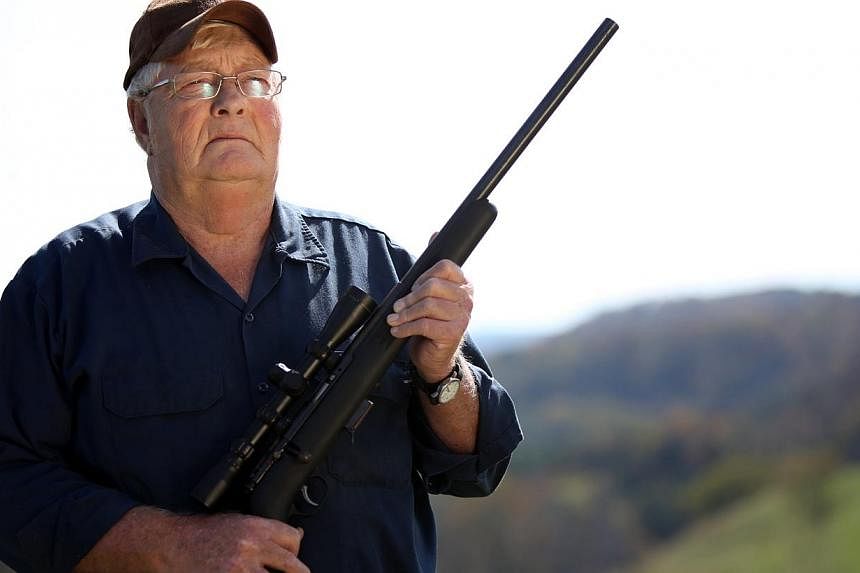The name of Las Vegas is such a unique selling point and alluring main draw that TV shows set in the city simply adopt that name as their titles and it basically says just about everything.
In the late 1970s, there was the Robert Urich-Tony Curtis detective series called Vega$. Then came the casino-employees series, Las Vegas (2003-2008), starring Josh Duhamel and James Caan.
Now, it is just Vegas with good guy Dennis Quaid (cinema's Frequency, Vantage Point) facing off as a righteous Wyatt Earp-type lawman against baldie-baddie Michael Chiklis (TV's The Shield, No Ordinary Family).
They stare daggers, shotguns, cowboy hats and stiff drinks at each other in both the wide-open sun-baked desert and darkened Sin City interiors, which are set in an inchoate state bordering on a new, burgeoning frontier.
For while the usual Las Vegas attractions abound - casinos, gangsters, corruption, expensive women, easy gals - the city is still up for grabs - both legally and especially illegally - in the 1960s as bodies get buried in the sand and the good guys have their hands full just trying to stay upright amid the laissez-faire greed.
The series is co-created by Nicholas Pileggi, screenwriter of Martin Scorsese's gangster films Goodfellas (1990) and Casino (1995).
Like Mad Men (New York City), Magic City (Miami) and Boardwalk Empire (Atlantic City), this is civilisation perched at an early time when big changes are looming, riches are being mined and a bit of mob-sanctioned violence here and there is bound to speed things handily along.
As good men work for pride and bad ones lust for power, Quaid is Ralph Lamb, a reluctant sheriff-ranch owner- Last Honest Man whose previous expertise as a very hands-on military policeman in World War II is called into permanent service after his crooked predecessor is found riddled with bullets.
He is aided in his quest to keep Las Vegas clean and proper by his all-in-the- family back-up, including younger brother and deputy sheriff Jack (Terra Nova's Jason O'Mara), son Dixon (Taylor Handley), an over-exuberant, horny yahoo, and assistant district attorney Katherine O'Connell (The Matrix's Carrie-Anne Moss), with big goo-goo eyes as a very stand-by-your-man woman.
Now, my issue here is with these shiny people. They are so one-dimensional as to be boring.
Apart from your desire to spank Dixon for being an unnecessary jackass, you may also find Quaid's Sheriff Lamb to be too good to be true as he crusades with a sanctimonious streak derived from the Old Testament.
Chiklis, so potent previously as an unethical cop in The Shield, has now been nullified by over-exposure in other shows into becoming a teddy bear. His character, Vincent Savino, the manager of the Savoy Hotel run by the Chicago mob, wants to expand the business by largely refraining from seriously violent methods. Which means he pulls his punches against Lamb, a situation not aided by the fact that despite the icy showdowns, Quaid and Chiklis share a screen chemistry more of chums than combatants here (both are executive producers).
Vegas, axed after one season, does not have the ironic smarts of Mad Men, the tainted glitz of Magic City or the mahogany rumblings and whisky philosophy of Boardwalk Empire, but it is still pretty watchable.
Meanwhile, paradise in America's home of wild men, the Appalachian Mountains, means ginseng. I am not kidding.
According to History Channel's fascinating new documentary series, Appalachian Outlaws, extremely valuable ginseng is grown out there in the hills and people struck by ginseng fever get very confrontational and downright nasty in digging them up from the ground and selling them by the plastic bag.
Due to insatiable demand from China, the "seng" - pronounced "sang" in hillbilly-speak - can fetch up to US$1,000 (S$1,266) a pound (450g).
The series zooms in on the big-time buyers and the small-time diggers ("sengers") they pay to cross turfs to fulfil orders in this strange new gold rush.
One, it is very funny to hear bearded, scary-looking angmohs from Deliverance country say the word "ginseng".
Two, heck, I might even hightail to West Virginia myself to grab some of that golden root.
That is, provided I do not get shot at or stabbed by the armed competitors or maimed by the nefarious booby traps - the "West Virginia barb wire" consists of fish hooks cutting right into your flesh - set up by landowners to ward off numerous poachers.
"Take your rebel a** back to Georgia, boy," one foreign intruder from the state of Georgia is warned.
Those folks, I tell you, do not take kindly to strangers lurking around their area and there is a certain wicked thrill in seeing rednecks take on rednecks as though The Swamp Thing is facing the mutant from The Hills Have Eyes.
Actual ginseng growers in the Appalachians have blasted this series for depicting their orderly legitimate industry as an untrue lawless one.
I have no idea, although I think the truth is somewhere in the middle as this show focuses on the smaller, nastier and infinitely more interesting hidden illegal trade. I mean, as with those mobsters in Vegas, you would prefer to be hooked by shady people with guns too, right?


